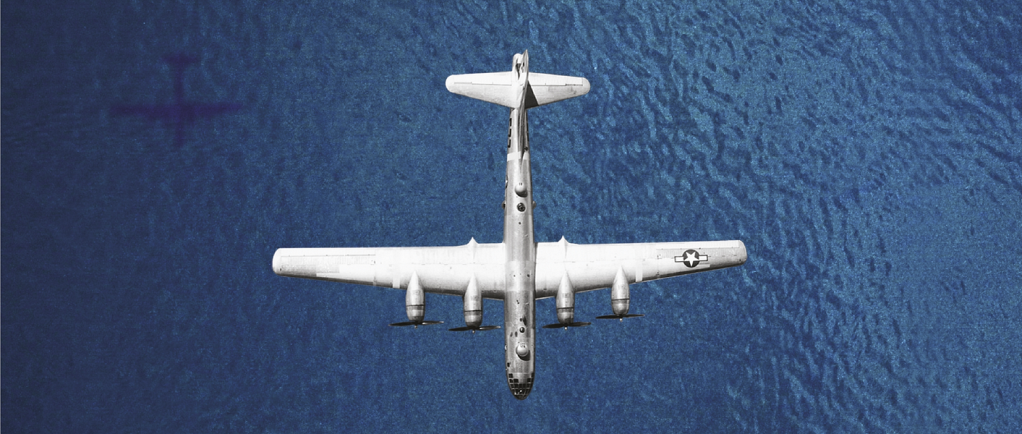With a high-profile tenure at the New Yorker, five New York Times bestsellers, and a popular podcast to his name, Malcolm Gladwell is one of his generation’s most recognizable storytellers. His newest book, The Bomber Mafia, contains Gladwell’s tale of the battle between two sects of air force strategic thought in the lead-up to and during World War II.
The Bomber Mafia explores the fate of daylight high-altitude precision bombing, a strategy devised by a group of American Air Corps theorists nicknamed “the Bomber Mafia.” The strategy, developed in a lonely airfield in Maxwell, Alabama, was constructed around a few key tenets: That the bomber would always get through, that bombers could drop bombs accurately from 30,000 feet, and that you could destroy key parts of industry which would destroy the enemy’s ability to fight. You could fight, and win, a war from the air.
Gladwell’s penchant for storytelling comes across most clearly in the audiobook version of his work. In fact, Gladwell initially designed this book as an audiobook; only later was it adapted into a print version. Having both read and listened to the work, I can say without reservation that the audio version of The Bomber Mafia is the superior version of Gladwell’s newest work. It is constructed much like a podcast, with snippets of various interviews with historians, generals, and descendants of his subjects, and stitched together in his familiar podcast rhythm and style.
It is refreshing to hear a story which was written for the ear rather than the eye. There is something compelling about hearing a story told to you; it is easier to become immersed in Gladwell’s construct. No need to think, just let your imagination fill in the blanks and go along for the ride. Gladwell’s best contribution to modern literature with this book is the possibility of some sort of revival in an oral tradition—the hint of a marriage between Homer and Audible.
The Bomber Mafia is what you might think of as a book of a bunch of micro-stories. In between these larger stories are smaller anecdotes which Gladwell has inserted to provide context and analysis or commentary. These small anecdotes help disguise the fact that Gladwell has stripped most of the nuance from the stories that he is trying to tell in order to construct a “clean” narrative that is most captivating to his audience.
Gladwell likes the Bomber Mafia because, he believes, they wanted to make war more humanitarian. These airmen had seen the horrifying sights of World War I, which wiped out an entire generation of young men. They believed that the key to avoid such destruction of life was precision bombing of industrial targets, which was intended to cripple the enemy while minimizing death as much as possible.
In opposition to the careful morality of precision bombing, Gladwell introduces its murderous nemesis: area bombing. “[Area bombing] was explicitly aimed at civilians. It said: you should hit residential neighborhoods and keep coming night after night, in wave after wave, until your enemy’s cities are reduced to rubble. Then the will of the enemy is going to sink so low that it will just give up.” So, if the idea is so evil, then who would employ such a technique?
Well, it turns out, the Brits would. Why would they do such a thing? Gladwell argues that they were sadists and psychopaths. Led along by Frederick Lindemann, a confidant of Churchill’s who was equal parts brilliant and lacking in human empathy and whom Gladwell paints as the villain in all this; the man who single handedly convinced Churchill that the RAF ought to bomb civilian houses.
Of course, Gladwell leaves out a lot of details in order to construct his allegory. The RAF had settled on morale bombing as their official doctrine long before Lindemann wrote his memo on “dehousing” to Churchill in 1942, the moment that Gladwell implies is the genesis of British morale bombing to his listeners. Gladwell devotes nearly an entire chapter of his book to describing how the Americans, in the interwar period between WWI and WWII, developed daylight high-altitude precision bombing. How much work does he put into describing the British effort? Two paragraphs, which can be summed up thus: The Brits didn’t believe in the technology and thought the Americans were idealists.
This is all the shrift that Gladwell gives the opposite side of the precision bombing vs. area bombing debate. Two paragraphs that do little or nothing to outline the intellectual forays which landed the RAF at area bombing as their doctrine. Saying “it seemed to [the British] that the Americans were holding an undergraduate philosophy seminar,” is little more than an accusation that RAF leaders did not care about the moral consequences of their actions. Portraying Lindemann, who Gladwell openly calls a sadist, as the “godfather” of the British version of the Bomber Mafia leaves no doubt about why the British chose morale bombing as their doctrine of choice. An astute reader may wonder why Gladwell displays Lindemann as the leader of the British Bomber Mafia but fails to list a single way that Lindemann influenced the interwar period where morale bombing was first conceived.
So too, Arthur Harris, the man who Churchill appointed to carry out the strategy of morale bombing, gets the short end of the stick. Gladwell calls him a psychopath, tells a smattering of anecdotes that paint him in the light in which Gladwell wants his listeners to see him, and then leaves him alone content in the fact that his audience now perceive “Butcher” Harris in the same way the author does. This depiction leaves no room for the conception of a man who said, “war is a nasty, dirty, rotten business. It’s all right for the Navy to blockade a city, to starve the inhabitants to death. But there is something wrong, not nice, about bombing that city.” Harris is a fascinating figure, one who had complex feelings and beliefs about the nature of war and, therefore, the methods by which it should be practiced. Gladwell’s reduction of his character might charitably be referred to as gross misrepresentation and uncharitably be called slander
The stifling influence of Gladwell’s moralizing does not only extend to those who he views as evil. Our beloved Bomber Mafia, those moralistic idealists, are flattened too. They are depicted as hoodwinked by their own idealism and the promise of new technologies, believing that you could, in fact, put a bomb in a pickle barrel from 30,000 feet in the air during combat conditions. In reality, if you read their works from their time at the Air Corps Tactical School, you would realize that they understood that their accuracy was not as good as the marketing departments made it out to be. They would be killing civilians as well, even if their primary objective was to hit industrial choke points.
At the end of the book, Gladwell quotes historian Conrad Crane who tells Gladwell that when he went to Tokyo to give a presentation on the firebombing of Japan a Japanese historian told him that the Japanese ought to be thankful for the firebombs and the atomic bombs.
The other thing that would have happened is that there would have been millions of Japanese who would have starved to death in the winter. Because what happens is that by surrendering in August, that gives MacArthur time to come in with his occupation forces and actually feed Japan…I mean, that’s one of MacArthur’s great successes: bringing in a massive amount of food to avoid starvation in the winter of 1945.
It’s a quote which remarkably echoes the earlier quote from Arthur Harris. Which is worse? Bombing a population to end the war as quickly as possible so that everyone can stop fighting and aid can be distributed to the loser? Or starving the other population out and extending the fighting another year or even two?
One passage from the book, more than any other, elucidates why Gladwell cannot come to terms with what he is writing about:
All war is absurd. For thousands of years, human beings have chosen to settle their differences by obliterating one another. And when we are not obliterating on another, we spend an enormous amount of time and attention coming up with better ways to obliterate one another the next time around. It’s all a little bit strange, if you think about it.
This, more than anywhere else in the book, reveals Gladwell’s limitations. By either refusing to take the idea of war seriously or being unable to do so, he is doomed to do little more than invent two dimensional caricatures of his subjects and their motivations. We’d all be a lot more content if the world were simply black and white, right and wrong. It would be a lot easier to navigate, to make the right choice. Malcolm Gladwell, in all his hubris, took to his pulpit and attempted, with The Bomber Mafia, to make things a little easier for everyone. He failed to do so.






Please note that we at The Dispatch hold ourselves, our work, and our commenters to a higher standard than other places on the internet. We welcome comments that foster genuine debate or discussion—including comments critical of us or our work—but responses that include ad hominem attacks on fellow Dispatch members or are intended to stoke fear and anger may be moderated.
With your membership, you only have the ability to comment on The Morning Dispatch articles. Consider upgrading to join the conversation everywhere.